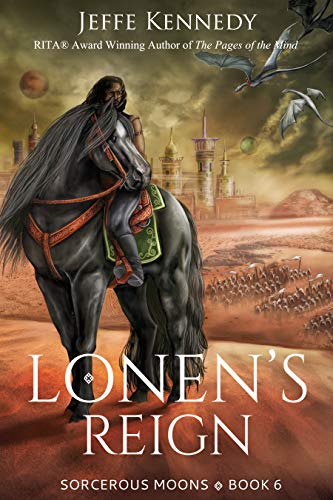 Lonen's Reign (Sorcerous Moons #6) by Jeffe Kennedy
Lonen's Reign (Sorcerous Moons #6) by Jeffe Kennedy Format: eARC
Source: author
Formats available: ebook
Genres: fantasy romance
Series: Sorcerous Moons #6
Pages: 160
Published by Brightlynx on March 20th 2019
Purchasing Info: Author's Website, Amazon, Barnes & Noble, Kobo
Goodreads
A Looming Threat
The sorceress Oria has finally come into her own—able to wield the power of her birthright and secure in the marriage she once believed would bring her only misery. But the past she escaped still chases her, and the certainty of war promises to destroy everything she’s fought to have.An Impossible War
Once before Lonen led an army in a desperate attempt to stop the powerfully murderous sorcerers of Bára—and he nearly lost everything. Now he must return to the battlefield that took the lives of so many of his people. Only this time he has more to risk than ever.The Final Conflict
With guile, determination—and unexpected allies—Oria and Lonen return to the place where it all began… and only hope that it won’t also be the end of them.
My Review:
This was a lovely wrap up to the series. Or, to put it another way that feels much more accurate, Lonen’s Reign provides the concluding chapters to this lovely fantasy romance.
That’s a hint, by the way. The Sorcerous Moons series reads way more like a single book split into chunks than it does a series of individual books. It only works if you read from the beginning. Every time I get a new “chapter” I find myself reading the synopses and my reviews of the previous books to catch myself up – even if it hasn’t been all that long since the previous book.
All the action in this book rests on what came before. Which is fitting for the concluding “chapter” of an epic (in scope if not in length) saga.
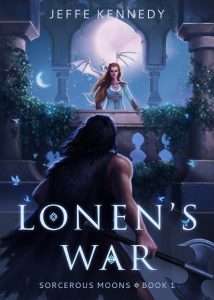 This is also the point where the story comes full circle. We began, in Lonen’s War, with then-Prince Lonen and his Destrye attacking the stronghold of their enemies, the Bara. Where Lonen discovers a disregarded Princess Oria imprisoned in her tower by her own weaknesses.
This is also the point where the story comes full circle. We began, in Lonen’s War, with then-Prince Lonen and his Destrye attacking the stronghold of their enemies, the Bara. Where Lonen discovers a disregarded Princess Oria imprisoned in her tower by her own weaknesses.
Oria finds herself the only functioning member of the Baran royal house, and brokers a peace treaty between her people and the Destrye – only to have that well-thought out and surprisingly well-working peace broken the moment her brother wakes up and forcibly takes the crown.
From that point forward, the story moves back and forth between Destrye and Bara, as Oria discovers the depths to which her own people have sunk – and the desperation that has forced Lonen’s people to rise and strike back.
Along the way, Oria discovers that all of the prohibitions, weaknesses and fears that have held her back are a tissue of lies and misdirections. And Oria and Lonen make a marriage of state and convenience that turns into so much more.
This is the point where the finally undisputed King of the Destrye, and his newly anointed Queen Oria risk everything they have on one final gamble against the heavily fortified and magically defended Bara – in the hopes of saving both their peoples.
All of their people. On both sides.
Escape Rating B+: I’m kind of reviewing the whole series at this concluding point. Because this book really doesn’t make much sense on its own, it feels necessary to look at the series as a whole.
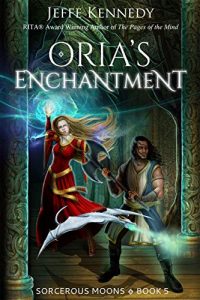 At the same time, I have to say that Lonen’s Reign feels like a fitting conclusion to the saga begun in Lonen’s War – and it feels equally fitting that both the first and the last book are titled after him. He began the action at the outset, followed by Oria’s reaction in Oria’s Gambit, followed by two middle books, then Oria’s finally coming into her own power in Oria’s Enchantment and now we sit at the conclusion.
At the same time, I have to say that Lonen’s Reign feels like a fitting conclusion to the saga begun in Lonen’s War – and it feels equally fitting that both the first and the last book are titled after him. He began the action at the outset, followed by Oria’s reaction in Oria’s Gambit, followed by two middle books, then Oria’s finally coming into her own power in Oria’s Enchantment and now we sit at the conclusion.
The two sides began at war, not that the Barans would have considered their actions warlike. Bara used to be a lush paradise, but the climate changed and their city turned into a desert. Instead of adapting, they used magic as well as engineering to steal water from the lands that surrounded them, making even more desert. Eventually they reached the lands of the distant Destrye, absolutely certain that their magical might gave them the right to strip those lands of their water and kill anyone who fought back.
Lonen brought the war home to them. And left with the prize and pride of Bara, Princess Oria. As they fell in love, it gave her strength of will, and the desperate determination to reach beyond everything that she had been taught. She had to in order to survive – and to be able to do the right thing.
Oria grounded Lonen, giving him the wisdom to become the king his people needed, in spite of the betrayals he suffered at home.
Their union, which does indeed become the love story for the ages as I said in my review of Lonen’s War, provides a path forward for both of their peoples, who have now become one.
In some ways, the story in Lonen’s Reign feels as if it is missing a few bits – almost all of the backstory is in their earlier books.
Because I really enjoy worldbuilding, it also felt as if Oria’s final revelations – the climate change, the resulting subjugation and despoiling of a wider and wider swath of territory, and, most of all, the way that magic as practiced in Bara became ossified in a way that almost literally set their people, and particularly the women, into stone that preserved the predatory status quo – got a bit of a short shrift. I’d love to know more about how it happened.
Maybe that’s another book sometime in the future.
Lonen’s Reign turned out to be a quick and mostly satisfying wrap-up to a fascinating fantasy romance series. I’m looking forward to both the author’s eventual return to the awesome Twelve Kingdoms series – because that is edging towards its final confrontation – and to her new fantasy romance series, beginning with The Orchid Throne later this year.

 Griff (Hell Squad #17) by
Griff (Hell Squad #17) by  Speaking of fans, while I am definitely a fan of this author’s work, I was not a fan of this particular story. I love the premise of this series, so if you like post-apocalyptic where the heroes get to stick it to the ones who brought that apocalypse, the series is generally a blast. The first book is wrapped around the romance between the leader of the Hell Squad (
Speaking of fans, while I am definitely a fan of this author’s work, I was not a fan of this particular story. I love the premise of this series, so if you like post-apocalyptic where the heroes get to stick it to the ones who brought that apocalypse, the series is generally a blast. The first book is wrapped around the romance between the leader of the Hell Squad (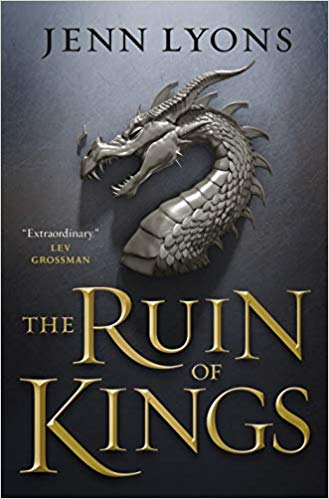 The Ruin of Kings (A Chorus of Dragons, #1) by
The Ruin of Kings (A Chorus of Dragons, #1) by 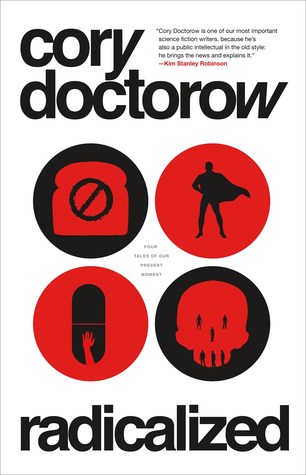 Radicalized by
Radicalized by 
 Current Giveaways:
Current Giveaways: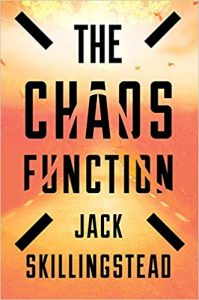 Blog Recap:
Blog Recap: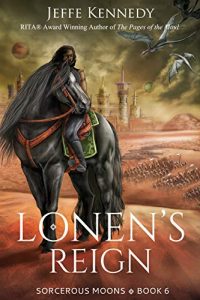 Coming This Week:
Coming This Week:















 Murder on a Midsummer Night (Phryne Fisher Mystery #17) by
Murder on a Midsummer Night (Phryne Fisher Mystery #17) by 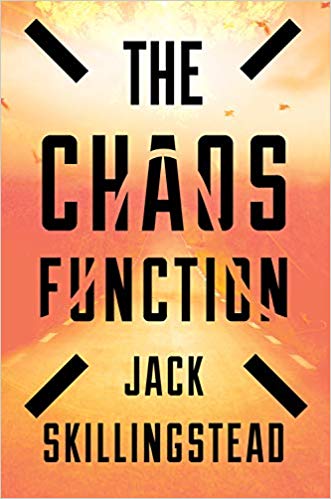 The Chaos Function by
The Chaos Function by 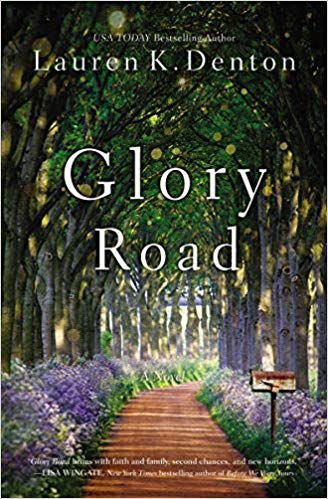 Glory Road by
Glory Road by 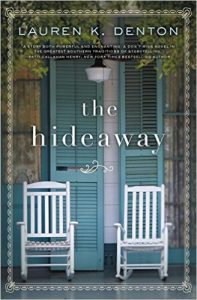 Escape Rating B+: This was, just like my reading of
Escape Rating B+: This was, just like my reading of 